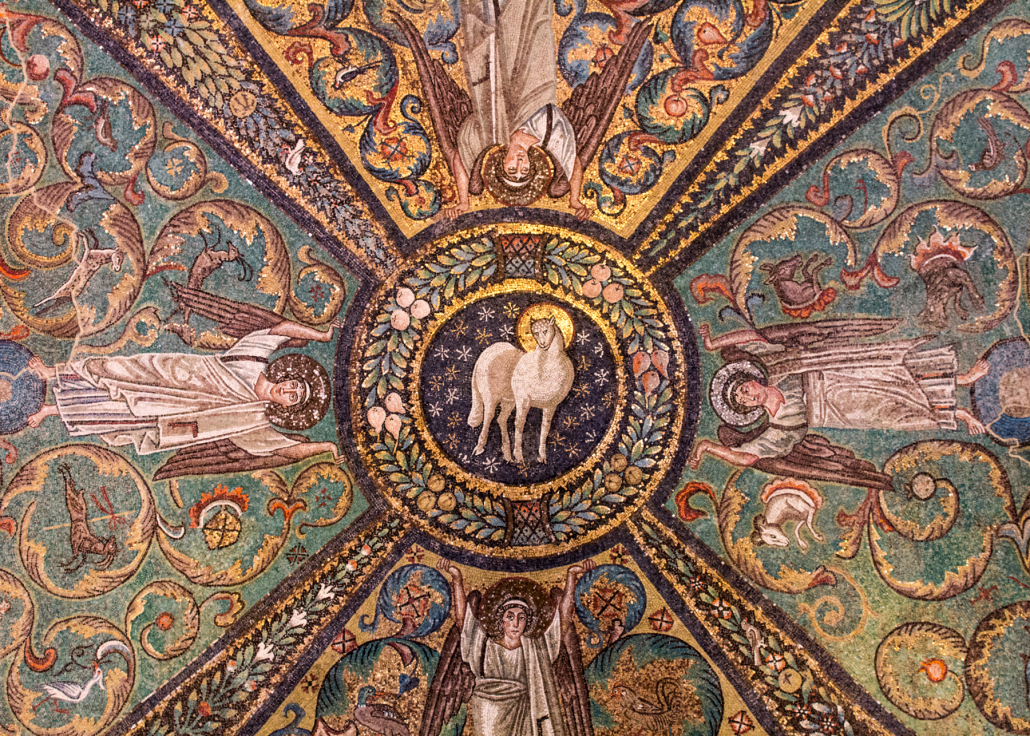This sixth-century mosaic of the Lamb of God is on the chancel ceiling of the Basilica of San Vitale in Ravenna, Italy. The lamb is encircled by a golden orb (enclosed with stars) and a fruited laurel wreath, supported by angels.
Photo: Fr. Lawrence Lew, OP.
‘Making all things new’
Andrew Collis
Easter 5, Year C
Revelation 21:1-6; John 13:31-35
On Friday we gathered at the Waterloo Neighbourhood Centre to remember Ross Smith (dec. 2016), and to unveil a commemorative seat in recognition of his mighty volunteer work in the community – his housing activism, his involvement with the ALP, the NAB, REDWatch and the South Sydney Herald.
Ron Hoenig MP, Jenny Leong MP and Cr Linda Scott were present, with José Perez, Mike Shreenan and Bill Yan from Counterpoint Community Services, Graeme de Villiers from Land and Housing Corporation, Robyn Grieves and Katherine Johnson from Kings Cross Community Centre, Heather from SSUC, Marjorie, Catherine, Pat, Sue and Norrie from the SSH, Geoff and Lyn Turnbull …
We remembered the “best” Ross (passionate and caring, hard-working) and the “real” Ross (prone to angry outbursts). In other words, we remembered our friend, Ross, whose life exemplified a love commanded by Jesus in today’s gospel – a love that suffers, strives, keeps trying – and a bearer of divine glory.
“Look for me where you are going to find me,” Jesus says, “love one another.”
Another of today’s readings is Revelation 21:1-6.
“Then I saw new heavens and a new earth … I also saw a New Jerusalem, the holy city, coming down out of heaven from God …
“And I heard a loud voice calling from the throne, ‘Look! God’s Tabernacle is among humankind! God will live with them; they will be God’s people, and God will be fully present among them …’
“The One who sat on the throne said, ‘Look! I’m making all things new!’”
Talking yesterday with Catherine, whose poetic tribute to Ross (“a faithful man filling a generous space”) concluded formalities on Friday, I saw that Ross, too, sought renewal – the renewal of trust, renewed respect for workers and migrants, elders, families, dogs and dog walkers.
Remembering Ross – the best and the real Ross – promoted/promotes a renewal of the inner city. Across party lines, religious differences … with hugs and good humour.
On Friday afternoon I was honoured to spend time with Ruth and Brett Evans and their family, in loving memory of Ruth’s mother Patricia. Patricia was profoundly deaf and so Ruth learned as a very young child to sign. I learned the signs for “remember”* and “thank you”* …
Later that night I read these words by poet-theologian Jean-Louis Chrétien: “The dilation of joy leads us to render thanks, but praise itself, in turn, dilates us … praise is part of how our being breathes.”
In the Spirit of such dilation, we might appreciate more keenly what John is sharing.
John is dream-reading a mysterious change of God’s own place. Or more precisely of the human understanding of God’s place …
The New Jerusalem is seen “coming down out of heaven from God”. Yet God is at this festive moment revealed to be – already down there. A voice “from the throne” booms: “Look! God’s Tabernacle is among humankind!” (Rev. 21:2ff.). The divine here gets revealed as immanent to the world. It is no longer found dwelling above as most of the tradition before and after presumes, but dwelling “with them” (Rev. 21:3b) – cohabiting.
Process theologian Catherine Keller writes: “The very meaning of divine space shifts: the creation no longer reads as something beneath the creator. For the creator lives within the creation: within earth and heaven. Even inside the city …
“The cosmic metamorphosis does not happen smoothly, as though from nothing – or through inevitable progress …
“[C]ollective transformation takes place with the dramatic shift away from the picture of God ruling, Caesar-like, from above. Only as divinity ‘comes down’ into intraworldly immanence can this new creation happen.”
Perhaps most important: this making-new takes place not as a replacement but as a renewal of our actual place.
It signifies a radical restoration of the natural world, not a supernatural substitution.
It happens only through the chaos of the struggle of affirmative against destructive forces within history.
God speaks – for the first time since Revelation’s opening chapter – to say, “Look, I’m making all things new” (Rev. 21:5). This is far from the numbing presumption that God simply produces a whole new universe to take the place of the old one.
Revelation is not about making all new things but making all things new.
“The apocalyptic regeneration of the earth and the atmosphere, and so of the creatures that they house, takes place within a new experience of the divine indwelling” (Catherine Keller).
May it be so. Amen.




